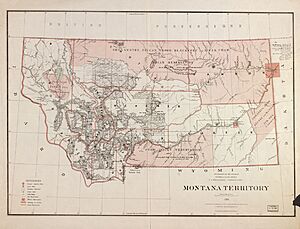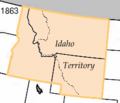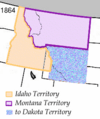Montana Territory facts for kids
Quick facts for kids Territory of Montana |
|||||||||
|---|---|---|---|---|---|---|---|---|---|
| Organized incorporated territory of the United States | |||||||||
| 1864–1889 | |||||||||
 Map of the Montana Territory, 1879 |
|||||||||
| Capital | Bannack (May 28, 1864–February 6, 1865) Virginia City (February 7, 1865–1875) Helena (1875–1889) |
||||||||
| • Type | Organized incorporated territory | ||||||||
| History | |||||||||
|
• Split from Idaho Territory
|
26 May 1864 | ||||||||
| 8 November 1889 | |||||||||
|
|||||||||
The Montana Territory was a part of the United States that was set up by the government. It existed from May 26, 1864, until November 8, 1889. On that date, it became the 41st state in the Union, known as the state of Montana.
Contents
How Montana Territory Started
| Historical population | ||
|---|---|---|
| Year | Pop. | ±% |
| 1870 | 20,595 | — |
| 1880 | 40,440 | +96.4% |
| Source: 1870–1880; | ||
The Montana Territory was created from the Idaho Territory. This happened when the U.S. Congress passed a law, and President Abraham Lincoln signed it on May 26, 1864.
Parts of the new territory were east of the Continental Divide. These areas had been part of the Nebraska Territory and Dakota Territory. The United States had gained them through the Louisiana Purchase.
The territory also included land from the Idaho Territory. This land was west of the Continental Divide and east of the Bitterroot Range. The United States had acquired this area through the Oregon Treaty. It was first part of the Oregon Territory and then the Washington Territory.
The boundary between the Washington Territory and Dakota Territory was the Continental Divide. However, the border between the Idaho Territory and Montana Territory followed the Bitterroot Range. This change happened because of political efforts by Sidney Edgerton. He soon became the first Governor of Montana Territory. His work helped Montana Territory gain the Flathead and Bitterroot valleys.
The official law that created Montana Territory described its border. It started at 44 degrees and 30 minutes north latitude. From there, it went west to the crest of the Rocky Mountains. Then, it followed the Rocky Mountains north to the Bitter Root Mountains. It continued north along the Bitter Root Mountains to the 39th degree of longitude west from Washington. Finally, it went north along that longitude line to the border with British lands.
The borders of the territory stayed the same throughout its existence. It became the State of Montana on November 8, 1889.
How the Government Worked
The law that created Montana in 1864 was called the Organic Act. It set up a standard way for the territory to be governed. It created three main parts of government: executive, judicial, and legislative.
However, the federal government in Washington D.C. had a lot of control. The U.S. Congress could cancel any laws passed by the local Montana legislature. The President of the United States chose the most powerful leaders in the territory. These included the governor, the territory's secretary, and three judges for the supreme court. The U.S. Senate had to agree with these choices.
The people living in the territory elected a legislative assembly. This assembly had two parts: a Council and a House of Representatives. Together, they made laws for the territory. Citizens also elected one delegate to Congress. This delegate was an advisor to the U.S. House of Representatives but could not vote. The territorial government was meant to help the area prepare to become a state. It allowed time for local systems to grow and for the population to increase.
Executive Branch Leaders
The executive branch was in charge of carrying out the laws. Its main leaders were the Governor and the Secretary of the Territory.
The Governor
The governor served for four years, unless the President removed them. The governor's jobs included:
- Making sure laws were followed.
- Being the leader of the local military (militia).
- Overseeing matters related to Native American tribes.
The governor also had to approve or reject laws passed by the territorial assembly within three days.
Dem Democratic Rep Republican
| # | Governor | Party | Term start | Term end | Appointed by | Notes |
|---|---|---|---|---|---|---|
| 1 | Sidney Edgerton | Rep | June 22, 1864 | July 12, 1866 | Abraham Lincoln | Didn't know he was appointed right away; left Montana in September 1865. |
| 2 | Green Clay Smith | Dem | July 13, 1866 | April 9, 1869 | Andrew Johnson | Started in October 1866; stopped acting as governor in summer 1868. |
| 3 | James Mitchell Ashley | Rep | April 9, 1869 | July 12, 1870 | Ulysses S. Grant | Removed by President Ulysses S. Grant in December 1869. |
| 4 | Benjamin F. Potts | Rep | July 13, 1870 | January 14, 1883 | Ulysses S. Grant | |
| 5 | John Schuyler Crosby | Rep | January 15, 1883 | December 15, 1884 | Chester A. Arthur | |
| 6 | B. Platt Carpenter | Rep | December 16, 1884 | July 13, 1885 | Chester A. Arthur | |
| 7 | Samuel Thomas Hauser | Dem | July 14, 1885 | February 7, 1887 | Grover Cleveland | |
| 8 | Preston Hopkins Leslie | Dem | February 8, 1887 | April 8, 1889 | Grover Cleveland | |
| 9 | Benjamin F. White | Rep | April 9, 1889 | November 8, 1889 | Benjamin Harrison |
Secretary of the Territory
The secretary of the territory also served a four-year term, unless removed by the President. Their duties included:
- Recording all laws and meetings of the legislative assembly and the governor's actions.
- Sending copies of laws and records to the President and Congress leaders.
- Sending reports on executive actions and letters to the President twice a year.
Very importantly, the secretary also acted as governor if the governor died, was removed, resigned, or was away from the territory.
Dem Democratic Rep [[Republican Party (United States)}}" | Rep
| # | Secretary | Party | Commissioned | Appointed by | Notes |
|---|---|---|---|---|---|
| 1 | Henry P. Torsey | Rep | June 22, 1864 | Abraham Lincoln | Turned down the job due to poor health. |
| 2 | John Coburn | Rep | March 3, 1865 | Abraham Lincoln | Resigned almost immediately after being appointed. |
| 3 | Thomas Francis Meagher | Dem | August 4, 1865 | Andrew Johnson | Acted as governor from Sep. 1865 to Oct. 1866, and again from early 1867 until his death on July 1, 1867. |
| 4 | James Tufts | Rep | March 28, 1867 | Andrew Johnson | Acted as governor from summer 1868 until summer 1869. |
| 5 | Wiley S. Scribner | Rep | April 20, 1869 | Ulysses S. Grant | Acted as governor from mid-December 1869 until late August 1870. |
| 6 | Addison Hiatt Sanders | Rep | July 19, 1870 | Ulysses S. Grant | Withdrew before taking office to take another job in Montana. |
| 7 | James E. Callaway | Rep | January 27, 1871 | Ulysses S. Grant | Arrived in Montana in mid-April 1871; served the longest as secretary. |
| 8 | James Hamilton Mills | Rep | May 10, 1877 | Rutherford B. Hayes | |
| 9 | Isaac D. McCutcheon | Rep | May 28, 1882 | Chester A. Arthur | Resigned due to scandal in Sep. 1883. |
| 10 | John S. Tooker | Rep | 1883 | Chester A. Arthur | Appointed sometime in late 1883 or early 1884. |
| 11 | William B. Webb | Dem | October 23, 1885 | Grover Cleveland | |
| 12 | Louis A. Walker | Rep | April 15, 1889 | Benjamin Harrison |
Congressional Delegate
The people of Montana Territory voted for a delegate to Congress. This person was elected for a two-year term. The territorial delegate had a seat in the House of Representatives. They could participate in debates, but they were not allowed to vote. During the time Montana was a territory, some delegates could even sit on special committees. However, they still could not vote on the floor of the House.
Dem Democratic <span style="color:#FFF; background-color:#E81B23" | Rep
| # | Delegate | Party | Term start | Term end | Congress | Notes |
|---|---|---|---|---|---|---|
| 1 | Samuel McLean | Dem | January 6, 1865 | March 3, 1867 | 38th, 39th | |
| 2 | James M. Cavanaugh | Dem | March 4, 1867 | March 3, 1871 | 40th, 41st | |
| 3 | William H. Clagett | Rep | March 4, 1871 | March 3, 1873 | 42nd | |
| 4 | Martin Maginnis | Dem | March 4, 1873 | March 3, 1885 | 43rd, 44th, 45th, 46th, 47th, 48th | |
| 5 | Joseph Toole | Dem | March 4, 1885 | March 3, 1889 | 49th, 50th | |
| 6 | Thomas H. Carter | Rep | March 4, 1889 | November 8, 1889 | 51st | After statehood, became Montana's first U.S. Representative. |
Images for kids
See also
 In Spanish: Territorio de Montana para niños
In Spanish: Territorio de Montana para niños
 | Stephanie Wilson |
 | Charles Bolden |
 | Ronald McNair |
 | Frederick D. Gregory |







